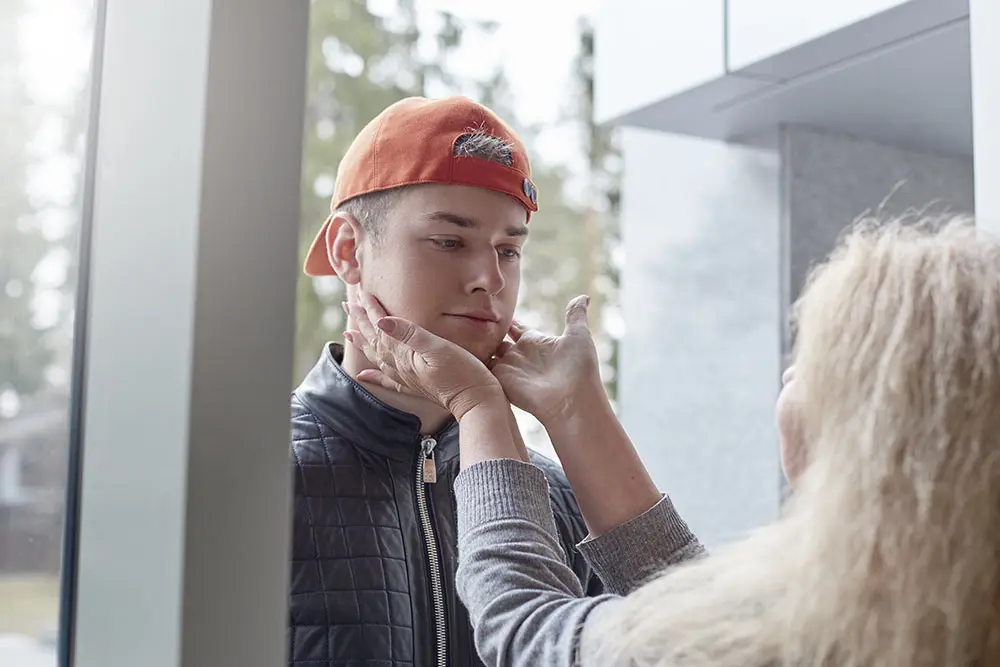7 Symptoms of Codependency

Codependence is a dysfunctional relationship in which one person is unhealthily reliant on caring for someone else – pushing them to enable that person in drug or alcohol use. While almost no one plans to be codependent, it works much like an addiction in that it slowly builds up until a small thing becomes a big one.
Codependent persons enable the people they love to continue addictions, which harms both themselves and the person they are caring for. As a result, codependent persons must seek out treatment to recover their own lives and health, and to help a person they are caring for seek treatment and move into recovery.
Seven Signs of Codependency
While codependency can be different in every person, there are many symptoms that commonly occur.
1. Enabling Behavior
Codependent persons will often knowingly or unknowingly enable their partner, spouse, son/daughter, sibling, or friend to continue using. While this is often done with the best of intentions it is sometimes done because the codependent person feels that they need to continue caring for the person. This results in people caring for drug addicts, paying rent, lying for mistakes, and even directly buying substances for the addict to use. Enabling can vary a great deal but always involves a codependent person making choices that allow the person they are caring for to continue using.
2. Low Self Esteem
Most codependent persons have low self esteem, resulting from personal problems, former abuse, emotional abuse, or long-term exposure to a substance user. This manifests in avoiding confrontation, putting others’ needs first, accepting verbal and physical abuse, and taking responsibility for others’ actions.
3. Enmeshment
Codependent persons often suffer from some form of enmeshment, where their personal boundaries mesh with the personal boundaries of the person they are caring for. This creates a high level of anxiety and boundary disorders around intimacy and separation so that the person can panic, worry, and even exclude caring for themselves when they are separated.
The points are:
4. Denial
Denying that the person they care for has a problem is a very common symptom of codependency, even with the person has a very obvious problem. Accusations will often be met with tears, self-blame, and outright denial such as “He doesn’t mean it”, “It’s just until things get better”, “She’s a good girl at heart,” etc. Denying problems and making excuses for ones that do exist mean that the person is not facing that the person they are caring for has problems and needs help. This is often fueled by mixed feelings of guilt and shame, because codependent persons often take personal responsibility for their charge and his or her actions.
5. Anxiety
Anxiety is a very common symptom of codependency. Here, the codependent person is likely always worried about the person they are caring for, about their relationship, and about whether they are needed. Being left alone or not being needed are the biggest fears that most codependent person’s face, and they may use this as an excuse to enable, manipulate, or coerce someone into doing something that they don’t want to do, to stay, or even to continue using.
6. Hypervigilance
Hypervigilance is a form of paranoia in which the person is always on edge, always ready to get something, and always worried. A codependent person with hypervigilance may constantly be on the lookout for something needed, be on the lookout for a problem, or constantly be there fussing, getting drinks, tucking the person in, etc. While a healthy level of vigilance is normal, hypervigilance consumes much of the person’s time, making it difficult for them to live their own life.
7. Dependence

Codependent persons have long-term relationships with substance abusers and they typically begin to structure their lives around those abusers. This might seem natural and normal from a distance, but up close, the person likely does very little or nothing other than care for one person with no real goals or motivation for their own life.
In almost every case, if a person is enabling someone to continue using, relying on caring for them as their primary activity, and spends most or much of their time worrying about that person, they may be codependent.
Codependency as a Comorbid Disorder
Comorbidity is very common in codependent persons. Unresolved codependency can cause disorders including eating disorders, psychosomatic illness, self-harm, alcoholism, drug-abuse, and anxiety or stress. Many codependent persons are also likely to suffer from social insecurity, social anxiety, panic disorder, depression, and even PTSD, either because of the codependency, due to trauma at the hands of the person they are caring for, or due to a pre-existing cause.
Comorbid disorders must be treated before or at the same time as codependency, because they feed into each other, exacerbating the problems including anxiety, dependence, and low self esteem. Most therapists can diagnose comorbid disorders, although it may take several sessions to do so.
Recovering From Codependency
There are several groups, therapies, and training programs designed to help codependent persons to move on and to develop healthier relationships. Support groups such as Co-Dependents Anonymous, Al-Anon, and Adult Children of Alcoholics all provide self-help.
In most cases, therapy revolves around helping individuals to develop self-esteem, to be less passive, to be more selfish, and to be healthily assertive in their relationships. In some cases, it may also revolve around working to overcome the victim mentality, in which the codependent person tries to blame the person they were caring for as the cause of their problems.
Codependency is a disorder that can be considered an addiction to caring for someone. People who are codependent often lose sight of the best interest for that person and instead work to maintain their relationship as a caregiver in a position of power, so that they are wanted and needed. This results in enabling, manipulative, and dysfunctional behavior that allows addictions to continue while harming the mental health of both parties.
If you or a loved one is suffering from codependency, it is important that you get help. Beginnings Treatment Centers offers family therapy, designed to help codependent persons to overcome their addiction and build their self-esteem and ego so that they can function on their own. Please Contact us now to speak with one of our experienced intake advisors. There is no obligation or cost for the initial consultation, and quick action might save your life or that of your loved one.

